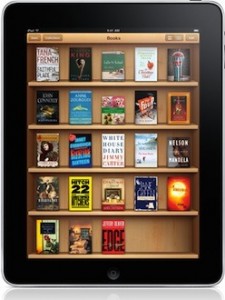Odds and ends and interesting facts about ebook publishing, about who is buying ebooks and where this industry might be heading in the coming years.
Ebook publishing finished 2010 with roughly $1 billion in sales: an astounding 800% year-on-year increase. It’s also well ahead of the projected sales figures I blogged about last year.
John Pulizzi and Johnathan Kranz over at Junta42 have a great definition of what an ebook can (and should) be for businesses:
Think of it as a white paper on steroids (the sexy white paper): a report, generally 12–40 or more pages in length, that presents complex information in a visually attractive, reader-friendly format. The content is both informative and entertaining; the tone, collegial; the format, “chunky” rather than linear, to facilitate skimming and scanning.
 Smashwords is now one of the largest distributors by title count of independent ebooks to retailers such as Apple, Barnes & Noble and Kobo. Not bad at all for a company that only 24 months ago started with just 140 books by 90 authors. I like these guys.
Smashwords is now one of the largest distributors by title count of independent ebooks to retailers such as Apple, Barnes & Noble and Kobo. Not bad at all for a company that only 24 months ago started with just 140 books by 90 authors. I like these guys.
Ebooks won’t replace all hard-copy books, but they are a suitable substitute for many—particularly in trade publishing. The attraction of ebooks is that they are convenient to buy and read right away, they’re affordable and they make keyword searches a cinch. But make no mistake: there are limitations to their form and design.
Ebook pricing continues to be a problem for publishers—particularly those whose business model remains rooted on moving and managing hard-copy books. I haven’t made up my mind fully on this yet. On one hand, it’s not smart to compete on price alone, but it’s a mistake to defend a higher-price strategy the way one publisher has done by saying “our ebooks cannot stand the low, mass market pricing some consumers think should be applied to every ebook.”
Preliminary research on this new market suggests that affordability is a powerful motivator behind ebook purchases: readers buy more books for less money.
Unlike many consumer technologies, older generations have been one of the largest early-adopters of ebooks. However, the market is rapidly changing. The measured intent-to-purchase consumer demographic is getting younger.
Seth Godin, best-selling author of a dozen books on marketing and ideas, recently announced he will no longer be publishing in, as he calls it, “a traditional way.” In its place: The Domino Project, which he promises “will redefine both what it means to be a publisher and what we think of as a book.” Watch this guy.
Pew Research reports that nearly two-thirds of consumers online (65%) have paid to download or access some kind of content. Music and games combined own the lion’s share of the consumer’s dollar online (66%), and eBooks claim 10%.
Although I can’t attend, the speakers’ list at Digital Book World Conference 2011 suggests this will be a great event. Looking forward to hearing what people have to say about it.
It takes far less time to write, edit, package and ship an ebook to market compared to what was entailed with conventional publishing 10 years ago. Maybe ebooks will mark the rebirth of serialized books: not just for novels but for non-fiction, too.
[Update] Post-Christmas 2010 sales data is starting to roll in. Wow! Of the top 50 in USA Today’s Best-Selling Books, published January 6, 2011, 19 had higher ebook than print sales. That’s the first time that more than two ebook titles have outsold their counterparts in print.